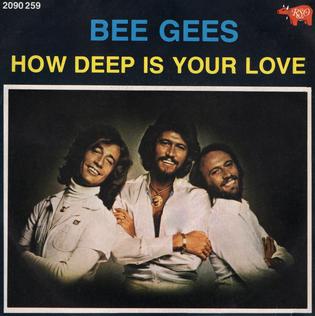May 9, 2020 —– Chart #27
Hello Musical Friends,
I try to provide musical variety in my chart of the day emails. Today’s chart will probably evoke responses on both sides of your love/hate musical tastes. Regardless, there is no denying the musical success and duration of this group. “How Deep Is Your Love” is a pop ballad written and recorded by the Bee Gees in 1977 and released as a single in September of that year. It was ultimately used as part of the soundtrack to the film Saturday Night Fever. It was a number three hit in the United Kingdom and Australia. In the United States, it topped the Billboard Hot 100 on 24 December 1977 (becoming the first of six consecutive US number-one hits), ended the 10-week reign of Debby Boone’s “You Light Up My Life” and stayed in the Top 10 for a then-record 17 weeks. This record would hold for fifteen years, until it was broken by “End of the Road” by Boyz II Men. This song spent 19 weeks in the top-ten after the introduction of Nielsen Soundscan in 1991 allowed singles to achieve longer runs on the charts. “How Deep Is Your Love” is the Bee Gees’ signature song. It spent six weeks atop the US adult contemporary chart. It is listed at number 22 on the 55th anniversary edition of Billboard’s All Time Top 100. Alongside “Stayin’ Alive” and “Night Fever”, it is one of the group’s three tracks on the list. The song was covered by Take That for their 1996 Greatest Hits album, reaching number-one on the UK Singles Chart for three weeks.
“How Deep Is Your Love” ranked number 375 on Rolling Stone’s list of the 500 Greatest Songs of All Time. In a British TV special shown in December 2011, it was voted “The Nation’s Favorite Bee Gees Song” by ITV viewers. During the Bee Gees’ 2001 Billboard magazine interview, Barry reportedly said that “How Deep Is Your Love” was his favorite Bee Gees song.
The Bee Gees were a pop music group formed in 1958. Their lineup consisted of brothers Barry, Robin, and Maurice Gibb. The trio were especially successful as a popular music act in the late 1960s and early 1970s, and later as prominent performers of the disco music era in the mid-to-late 1970s. The group sang recognizable three-part tight harmonies; Robin’s clear vibrato lead vocals were a hallmark of their earlier hits, while Barry’s R&B falsetto became their signature sound during the mid-to-late 1970s and 1980s. The Bee Gees wrote all of their own hits, as well as writing and producing several major hits for other artists. The Bee Gees are widely referred to by many critics, media outlets and fellow artists as the Kings of Disco.
Born on the Isle of Man to English parents, the Gibb brothers lived in Chorlton, Manchester, England until the late 1950s. There, in 1955, they formed the skiffle/rock and roll group the Rattlesnakes. The family then moved to Redcliffe, in the Moreton Bay Region, Queensland, Australia, and then to Cribb Island. After achieving their first chart success in Australia as the Bee Gees with “Spicks and Specks” (their 12th single), they returned to the UK in January 1967, when producer Robert Stigwood began promoting them to a worldwide audience.
The Bee Gees have sold over 120 million records worldwide making them one of the world’s best-selling artists of all time. They were inducted into the Rock and Roll Hall of Fame in 1997; the presenter of the award to “Britain’s first family of harmony” was Brian Wilson, historical frontman of the Beach Boys, another “family act” featuring three harmonizing brothers. The Bee Gees’ Hall of Fame citation says, “Only Elvis Presley, the Beatles, Michael Jackson, Garth Brooks and Paul McCartney have outsold the Bee Gees.” The Bee Gees are the third most successful band in Billboard charts history after the Beatles and the Supremes.
Following Maurice’s death in January 2003 at the age of 53, Barry and Robin retired the group’s name after 45 years of activity. In 2009, Robin announced that he and Barry had agreed the Bee Gees would re-form and perform again. Robin died in May 2012, aged 62, after a prolonged struggle with cancer and other health problems, leaving Barry as the only surviving member of the group.
Live version (with a little less hair):
Enjoy,
Stan
